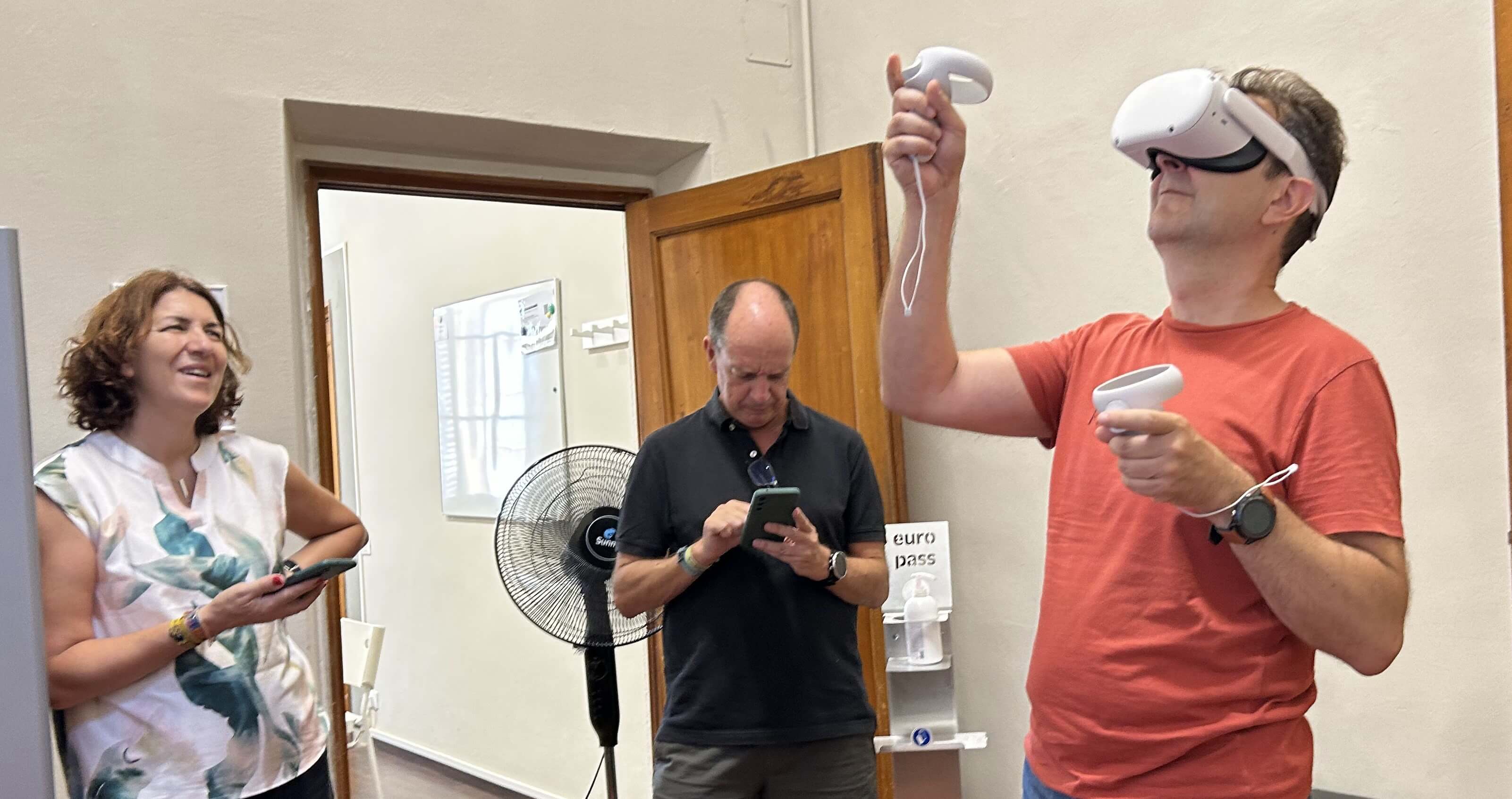Erasmus Accreditation
2021-2027
DIGITAL IDEA has been awarded Erasmus Accreditation for the period 2021-2027 in the field
of Adult Education following the approval of its Erasmus Plan by the National Unit (I.K.Y). The Accreditation process enables our organization to remain
in the new program for a few years, organizing mobility activities through simplified applications.
The objectives of our Erasmus project are:
- The professionalization of our Adult Educators - members
- To explore the possibilities of enhancing the use of ICT in the learning process and to develop innovative methods of digital and blended learning as a tool for internationalization
- To improve the quality of teaching and learning by acquiring skills to teach a changing adult population (unemployed, migrants, elderly people, adults with low basic skills, etc.)
Erasmus Accreditation 2021-2022
Members of the Scientific Association DIGITAL IDEA within the framework of the approved European ERASMUS+ program KA121 in the field of Adult Education (2021-1-EL01-KA121-ADU-000012625) participated in two Structured Training Courses.
The first mobility took place in Palermo, at the SHIPCON Organization. The training seminar enabled five (5) Adult Educators - members of the DIGITAL IDEA Scientific Association to improve their skills in social and emotional learning (social & emotional learning) and to recognize the importance of emotional intelligence (Emotional intelligence) in Education.
The second mobility took place in Berlin, at the EUROPASS ACADEMY Organization. The training seminar enabled four (4) Adult Trainers - members of the DIGITAL IDEA Scientific Association to learn the PROJECT BASED LEARNING teaching method/strategy where the trainees develop deep knowledge and skills through engaging learning activities within a real, meaningful context and with the Educator in a mentoring role that promotes critical thinking, autonomy, collaboration and 21st century skills.
Training in Palermo / Italy
"Emotional intelligence"
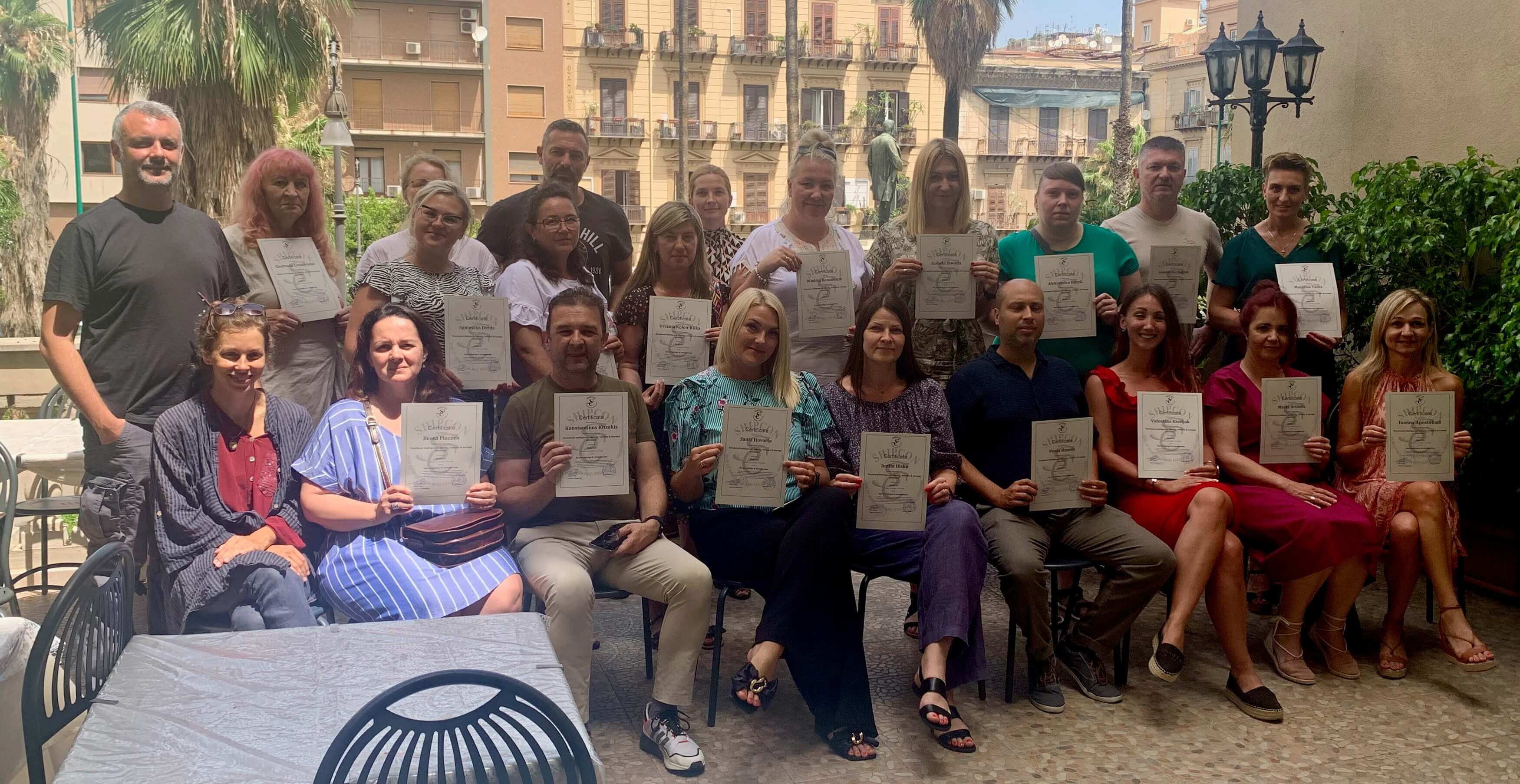
The learning outcomes of the project were:
- Enhance self-awareness
- Acquire or improve social skills
- Enhance the ability to communicate through active listening with your colleagues
- Stay always in control and avoid conflict
- Ability to control strong emotions by not acting on raw feelings
- Develop deeper and more intimate relationships with peers and colleagues
- Build trusting relationship in the classroom
Emotional Intelligence is widely recognized as fundamental ingredient for an individual and his/her interaction with others at personal and professional level. When it comes at any workplace, including an educational setting, it can be argued, that if an organization aims to lift itself from averagely successful to excellent it will largely depend on how well the people within the organization or business work together: this is the value of emotional intelligence in the workplace. More specifically, the concept of emotional intelligence at work is how people and relationships function as well as how important skills are demonstrated, such as leadership, teamwork, management skills and partnership. The inherent ingredients of emotional intelligence are founded on the basis of excellent practice and understanding of communication. Therefore, an organization which invests in the concept of emotional intelligence has staff who are motivated, productive, efficient and aligned with the goals and aspirations of the organization itself. The result of this is staff which is effective, confident in what they do and rewarded.
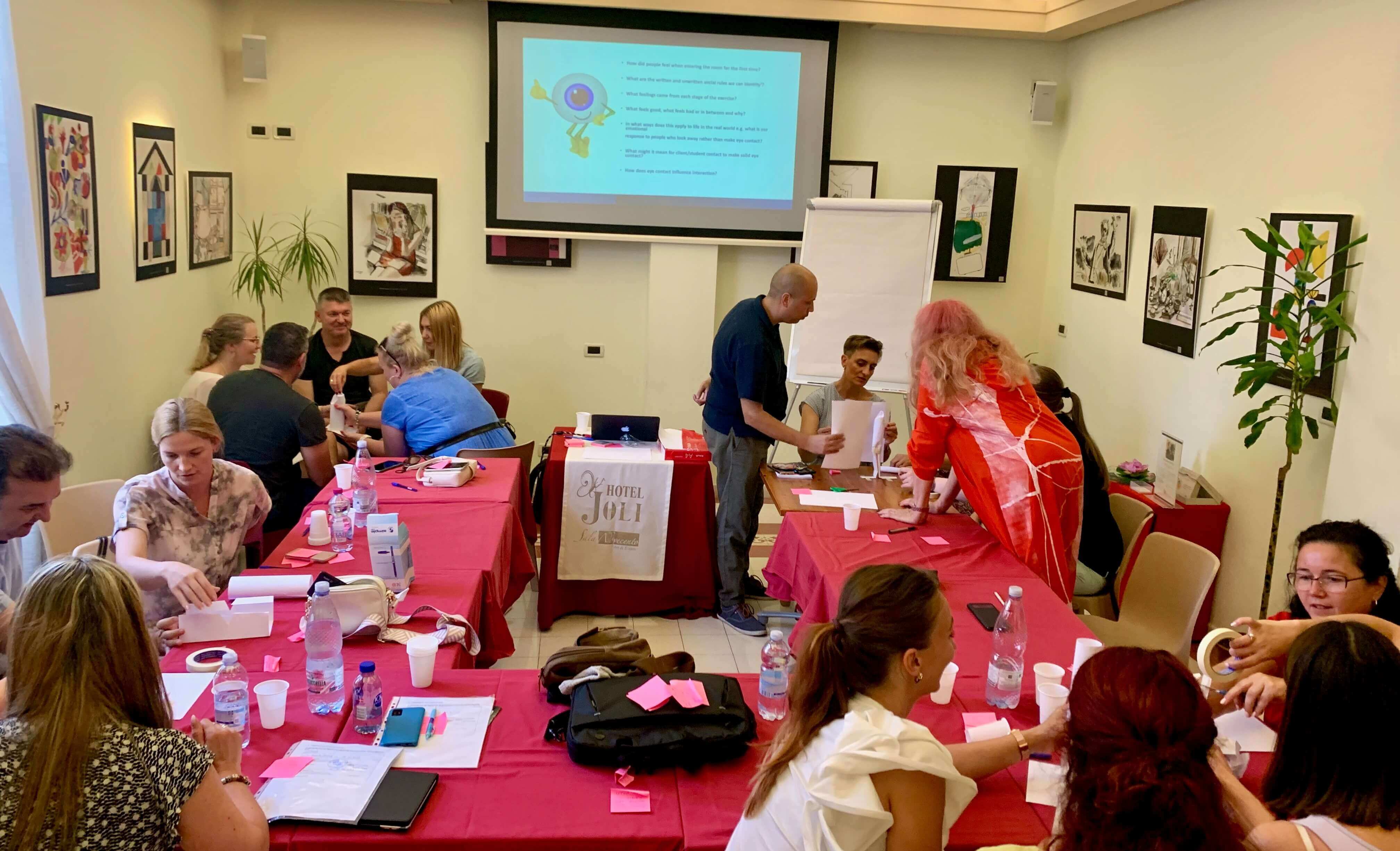
Methodology
The course methodology ensured the active involvement of the participants in all phases, that is, prior,
during and after the delivery of the course. More specifically, the participants received preparatory
material, which covered all important concepts to be presented during the delivery of the course. The
participants had the opportunity to exchange feedback with the organizer of the course and the trainer, as
well as to request any clarification related to the content of the course.
The methodology of the training is based on a combination of three important elements:
- Provision of knowledge required
- Use of training tools, such as case studies, videos, games, animations & exercises
- Feedback/reflection
Training material
- Emotional Intelligence Day 1
- Emotional Intelligence Day 2
- Emotional Intelligence Day 3
- Emotional Intelligence Day 4
- Emotional Intelligence Day 5
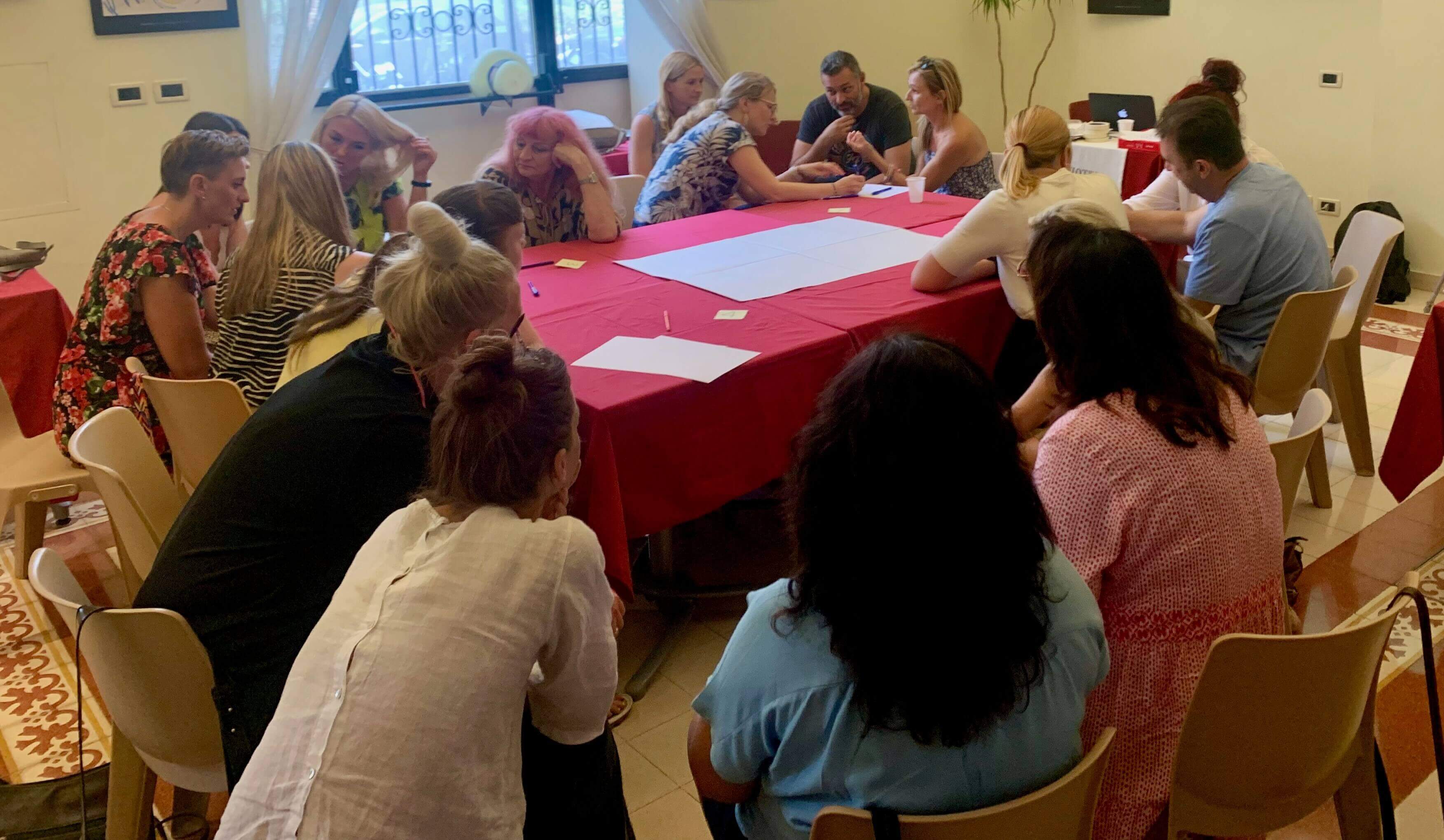
Training in Berlin / Germany
"Project-Based Learning"
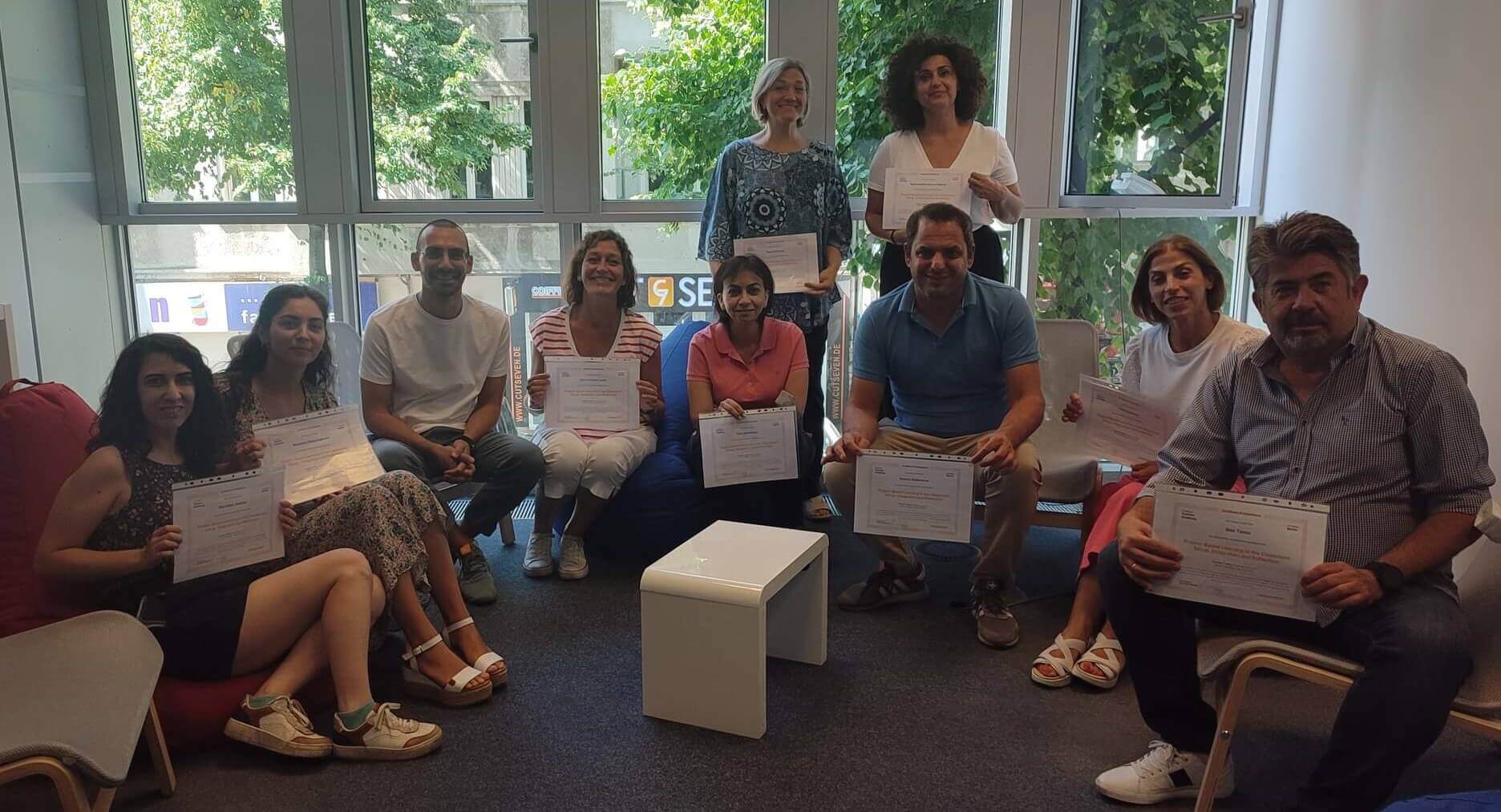
The learning outcomes of the project were:
- Understand what PBL really is and how it can be useful for any educator
- Incorporate curriculum topics from any discipline into PBL
- Getting hints and tools to motivate students and to boost their key competences
- Gain insight into a variety of activities that you can use in PBL
- Confidently implement PBL in their classes and/or school communities
- Assess PBL products confidently
- Evaluate students’ learning of curriculum topics
- Create detailed, effective, manageable PBL lesson plans
In Project-based learning (PBL), pupils develop deep knowledge and skills through engaging learning
activities within a student-led, real-world, meaningful context. PBL can be used in any subject, is easily
implementable, and does not require teachers to turn their job upside down. During the course, it was
discovered what PBL is through a variety of inspiring examples and also found out how ones curriculum topics
can be incorporated in PBL.
Which tools are best for the students, how to effectively evaluate their learning, and how to be a good
mentor which promotes critical thinking, autonomy, collaboration and more 21st century skills were the main
subjects of this training. By the end of the course, it was realized how PBL can provide to the trainers
great solutions for fruitful learning experiences, and have gained confidence and enthusiasm to exploit the
opportunities it offers. Finally, the participants have the chance to plan a successful, manageable PBL
activity.
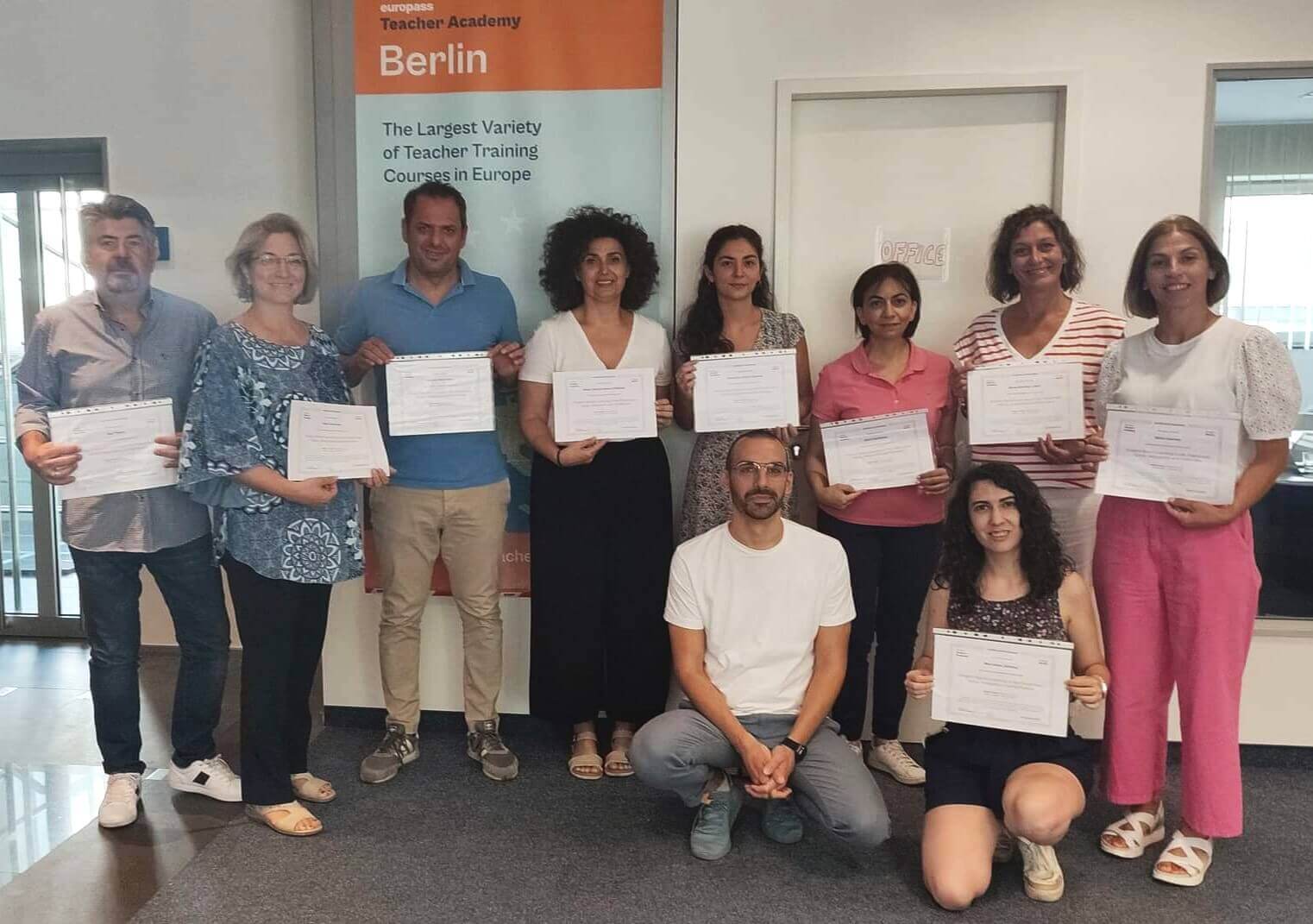
Methodology
Practical strategies and tools were available for the participants to nurture students’ key competences, and
to make a difference both in your lessons and in your schools.
The participants become deeply aware how this teaching strategy can make learning more long-lasting, and are
ready to use a working PBL model they’ll have designed for their own students!
Training material
- PBL presentation
- Life skills brainstorming
- Gowth vs Fixed
- What is PBL
- Video: Project Based Learning
- Video: Problem Based Learning Basics
- Video: What is Problem-Based Learning?
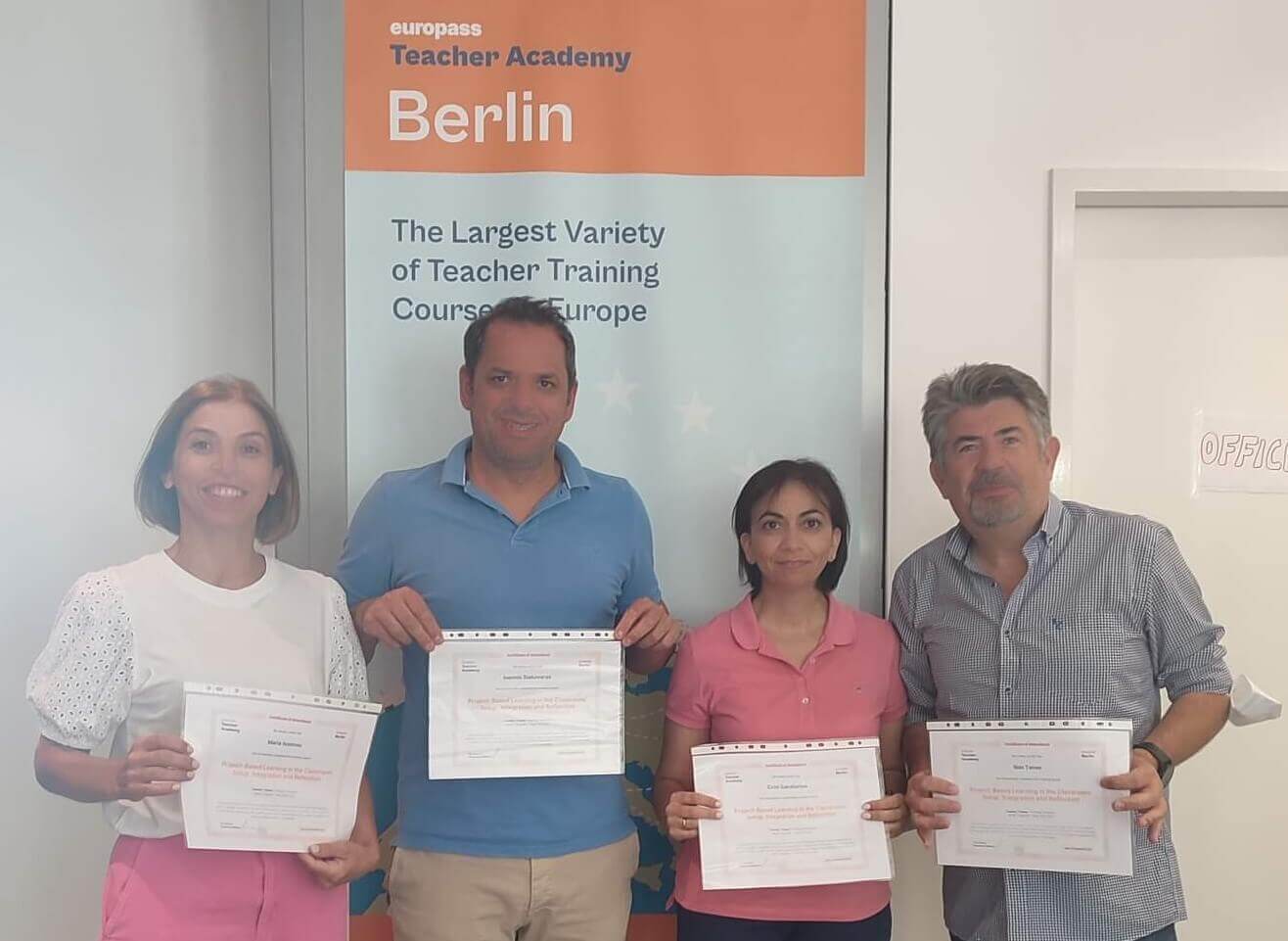
Erasmus Accreditation 2022-2023
Members of the Scientific Association DIGITAL IDEA within the framework of the approved European ERASMUS+ program KA121 in the field of Adult Education (2022-1-EL01-KA121-ADU-000061795) participated in three Structured Training Courses.
The first mobility took place in Nicosia, at the A&A Emphasys Interactive Solutions Organization. The training seminar enabled six (6) Adult Trainers - members of the DIGITAL IDEA Scientific Association to experience the creation of VR and AR applications on a practical level and discuss gamification elements for making attractive simulations for trainees in the classroom and other learning environments.
The second mobility took place in Florence, at the europass Teacher Academy Organization. The training seminar enabled one (1) Adult Trainer - member of the DIGITAL IDEA Scientific Association to about online applications and online environments that boost collaborative work and creativity such as Padlet, Slido, Plot Generator, or Canva.
The third mobility took place in Florence, at the europass Teacher Academy Organization. The training seminar enabled two (2) Adult Trainers - members of the DIGITAL IDEA Scientific Association to demonstrate how educational technologies connected to AI, AR, VR, and 3D- printing can help promote learning while lightening the working load on teachers' shoulders.
Training in Nicosia / Cyprus
"Designing disruptive experiences - VR, AR and Gamification!"
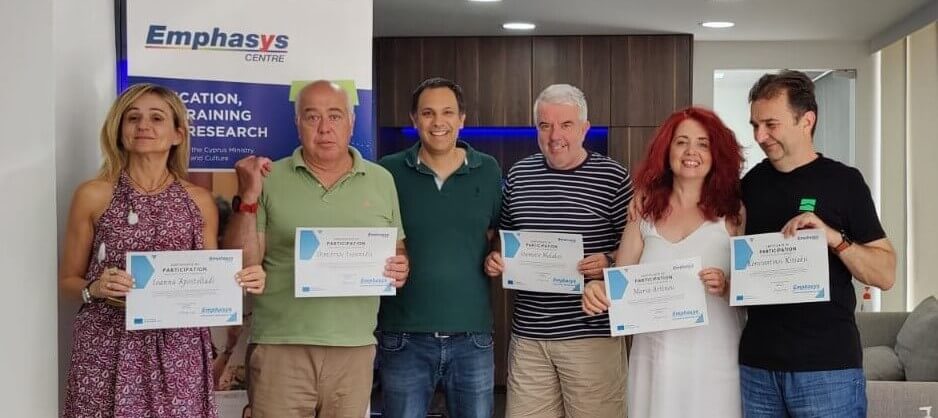
The learning outcomes of the project were:
In the picturesque setting of Nicosia, six dedicated trainers embarked on a transformative journey focused
on revolutionizing adult education through immersive technologies. Throughout this training mobility, these
educators delved deep into the realms of Virtual Reality (VR), Augmented Reality (AR), and Gamification,
unlocking a world of innovative teaching methods and engaging experiences. The outcomes of this immersive
training initiative were profound, leaving an indelible mark on the trainers' professional growth and the
learning experiences they can now craft for their students.
Mastery of Immersive Technologies:
Participants gained comprehensive expertise in VR and AR technologies, mastering the art of creating
immersive, interactive environments. They explored diverse tools and techniques, enabling them to
seamlessly
integrate these technologies into their teaching methodologies.
Gamified Learning Strategies:
The training empowered trainers with the knowledge and skills to gamify educational content effectively.
By understanding game mechanics, they learned to design educational games that captivate learners'
attention, making the learning process inherently engaging and enjoyable.
Innovative Content Creation:
Through hands-on sessions, trainers honed their abilities to develop content tailored for VR and AR
platforms. They learned to conceptualize, design, and implement educational materials that harness the
full potential of immersive technologies, ensuring a rich and immersive learning experience for their adult
students.
Personalized Learning Pathways:
The training emphasized the importance of personalized learning. Trainers discovered how VR, AR, and
gamification could be tailored to meet individual learners' needs, enabling them to create
customized educational journeys that cater to diverse learning styles and preferences.
Enhanced Classroom Engagement:
Armed with newfound knowledge, trainers explored strategies to enhance classroom engagement. They
learned to leverage VR and AR experiences to create interactive lessons, ensuring that adult learners
remained actively involved in the learning process, and fostering a dynamic and participative classroom
environment.
Effective Assessment Techniques:
Participants delved into innovative assessment methods within immersive environments. They
explored how gamification could be employed to design assessments that evaluate learners' skills and
knowledge in a manner that is both challenging and rewarding, ensuring a holistic understanding of their
progress.
Collaborative Learning Communities:
The training fostered a sense of community among the trainers, encouraging collaboration and
knowledge sharing. By engaging in discussions and collaborative projects, they not only enhanced their
skills but also contributed to a collective pool of expertise, creating a supportive network for continuous
professional development.
The impact of this training mobility in Nicosia was transformative, empowering these trainers to revolutionize adult education in Greece. Armed with the tools of immersive technologies and gamification, they returned as pioneers, ready to create disruptive and enriching learning experiences for their students, shaping the future of education one interactive lesson at a time.
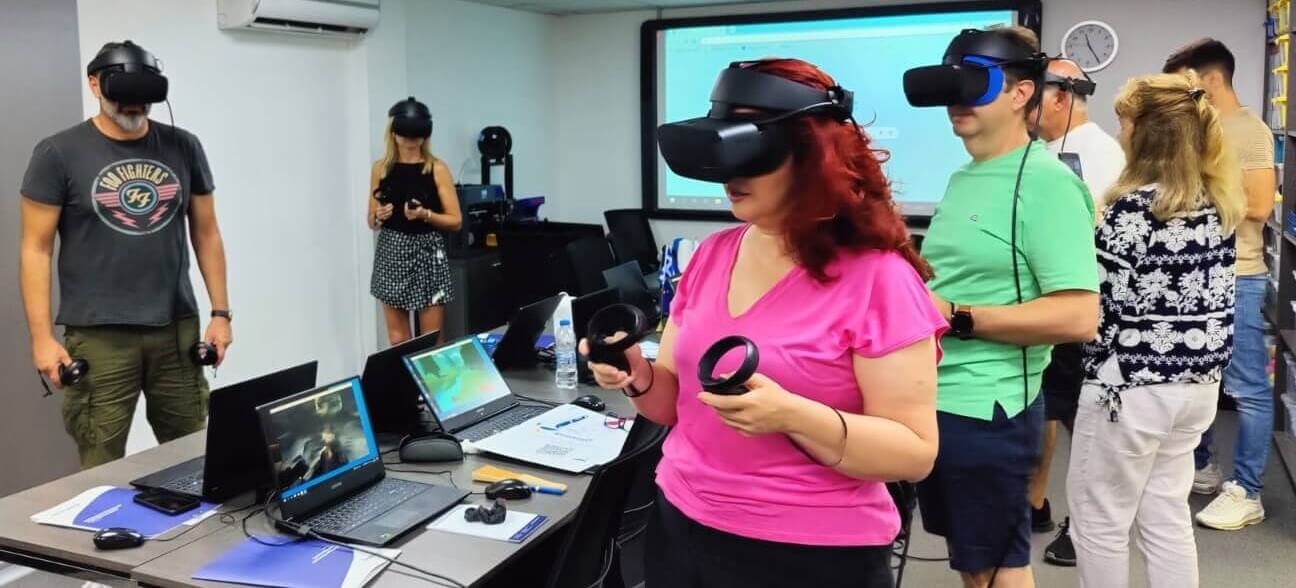
Methodology
Needs Assessment:
Conduct a comprehensive needs assessment to understand the specific requirements and challenges faced by
adult learners in Greece. Identify areas where immersive technologies and gamification could enhance the
learning experience for adult students.
Theoretical Foundations:
Provide trainers with a solid theoretical foundation in VR, AR, and gamification concepts. Explore the
pedagogical theories that support the integration of immersive technologies and game-based learning in adult
education.
Hands-on Workshops:
Organize hands-on workshops covering the technical aspects of VR and AR development. Facilitate practical
sessions on gamification principles, including game mechanics, storytelling, and rewards systems.
Case Studies and Best Practices:
Analyze successful case studies of VR, AR, and gamified learning implementations in various educational
contexts. Discuss best practices and lessons learned from real-world applications, emphasizing both
successes and challenges.
Collaborative Project-Based Learning:
Implement collaborative, project-based learning activities where trainers work in teams to design and
develop VR, AR, or gamified learning experiences. Encourage peer-to-peer feedback and collaborative
problem-solving to enhance creativity and innovation.
Expert Guest Lectures:
Invite experts in the fields of VR, AR, and gamification to deliver guest lectures and share their insights
and experiences. Facilitate interactive Q&A sessions to allow trainers to directly engage with industry
professionals and expand their knowledge.
Continuous Iterative Feedback:
Provide continuous, iterative feedback on the trainers' projects and designs, focusing on both technical
aspects and pedagogical effectiveness. Encourage trainers to refine their creations based on feedback
received from peers, mentors, and experts.
Real-World Testing and Evaluation:
Arrange opportunities for trainers to pilot their VR, AR, and gamified learning experiences with small
groups of adult learners. Collect qualitative and quantitative data to evaluate the effectiveness of the
experiences in enhancing learning outcomes and engagement levels.
Reflection and Peer Discussions:
Facilitate reflective sessions where trainers can share their experiences, challenges, and successes.
Encourage peer discussions to promote a culture of continuous learning and knowledge exchange among the
trainers.
Documentation and Resource Sharing:
Compile comprehensive documentation, including guides, tutorials, and best practices, developed during the
training. Create a digital repository where trainers can access resources, project templates, and additional
learning materials for future reference.
Follow-up Support and Mentorship:
Offer post-training support and mentorship to trainers as they implement immersive technologies and
gamification in their adult education programs. Provide a platform for ongoing communication, allowing
trainers to seek guidance and share their progress with the community.
By following this structured methodology, trainers did not only acquire the necessary technical skills but also developed a deep understanding of the pedagogical principles underpinning the effective integration of VR, AR, and gamification in adult education. This approach ensured a holistic and sustainable transformation of their teaching practices, leading to enhanced learning experiences for adult learners in Greece.
Training material
- Gamification in Learning: 7 Powerful Strategies to Implement
- Understanding the ROI of Gamification in Adult Learning
- Unity Essentials
- VR Development
- Mobile AR Development
- Low-Cost Gamification For Adult Learners
- Develop your innovative program
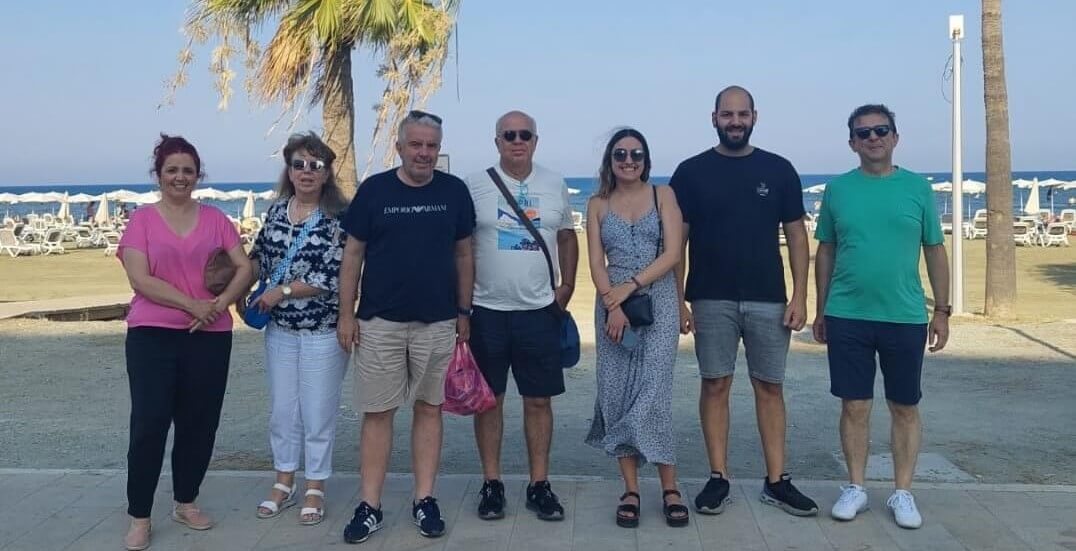
Training in Florence / Italy
"ICT Tools for a Creative and Collaborative Classroom"
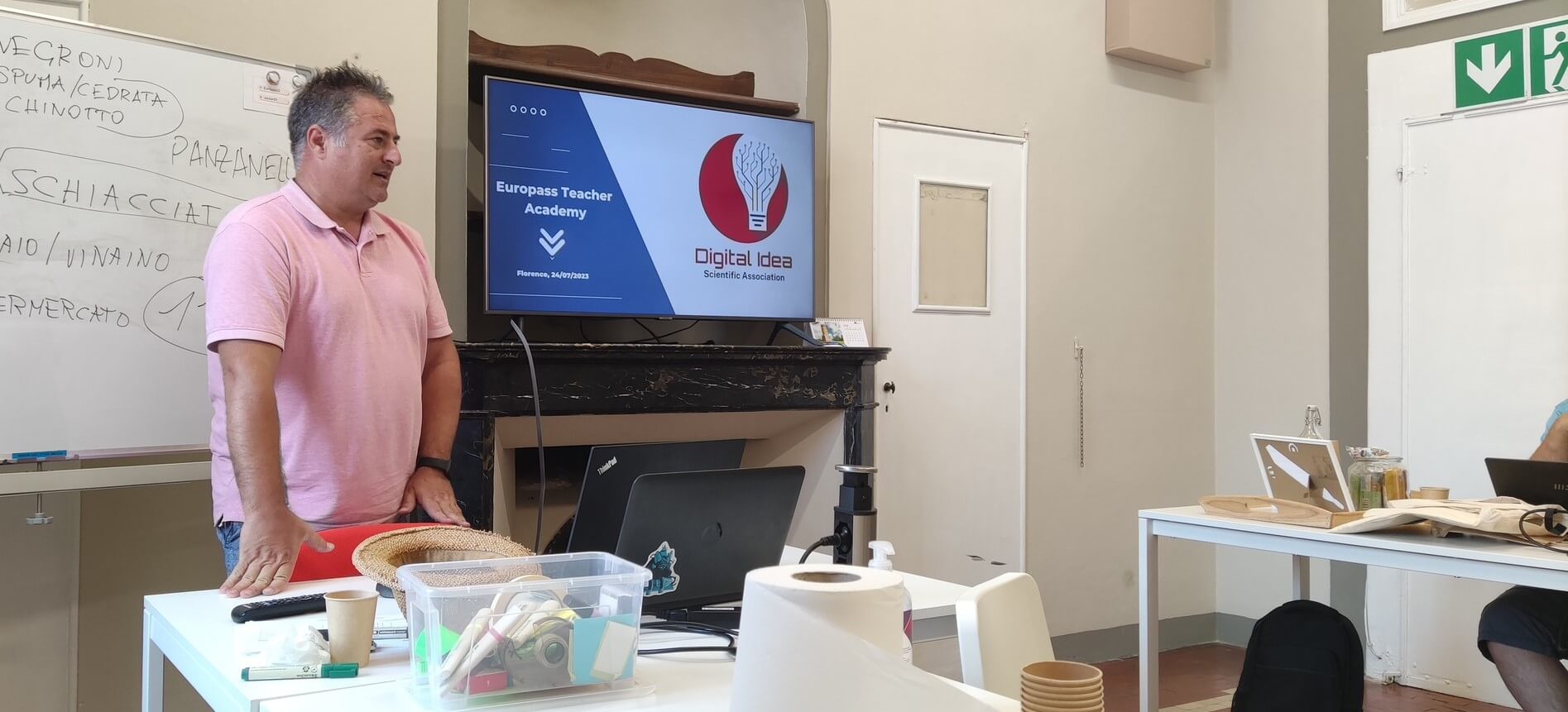
The learning outcomes of the project were:
In the enchanting city of Florence, a dedicated trainer from Greece embarked on a transformative training
mobility focused on integrating ICT tools into the realm of adult education. This immersive experience
enriched the trainer's skills and knowledge, leading to a myriad of positive learning outcomes tailored for
the creative and collaborative classroom setting.
Mastery of Diverse ICT Tools:
The trainer gained proficiency in a wide array of ICT tools, ranging from interactive whiteboards to
collaborative online platforms. This mastery enabled the creation of engaging multimedia content, fostering
interactive learning experiences for adult students.
Innovative Teaching Strategies:
By exploring innovative teaching methodologies, the trainer learned to incorporate ICT tools seamlessly into
lesson plans. This integration not only enhanced the delivery of educational content but also encouraged
active participation, making learning more dynamic and responsive to diverse learning styles.
Cultivation of Digital Literacy:
The training emphasized the importance of digital literacy in the modern world. The trainer acquired skills
to empower adult learners with essential digital competencies, ensuring they are proficient in utilizing ICT
tools for communication, research, and creative expression.
Collaborative Learning Environments:
The mobility experience highlighted the potential of ICT tools in creating collaborative learning
environments. The trainer discovered how online forums, virtual classrooms, and collaborative document
editing platforms could facilitate teamwork, encouraging adult learners to work together, share ideas, and
solve problems collectively.
Personalized Learning Pathways:
Through the utilization of adaptive learning software and digital resources, the trainer learned to tailor
educational experiences to individual learners. This personalized approach addressed the diverse needs and
interests of adult students, promoting a deeper understanding of the subject matter.
Cultivation of Creativity:
The integration of ICT tools inspired creativity in both teaching and learning. The trainer explored methods
to encourage adult learners to express themselves through multimedia projects, digital storytelling, and
interactive presentations, fostering a creative and stimulating classroom atmosphere.
Enhanced Assessment Strategies:
The mobility experience enhanced the trainer's ability to design varied and meaningful assessments using ICT
tools. From online quizzes to multimedia presentations, the trainer acquired techniques to assess adult
learners' progress effectively, providing timely feedback for continuous improvement.
Effective Classroom Management:
The trainer learned strategies to manage the ICT-equipped classroom efficiently. This included techniques to
maintain focus, ensure technical reliability, and troubleshoot common issues, ensuring smooth and
uninterrupted learning experiences for adult students.
Cultivation of Lifelong Learning Skills:
The mobility experience instilled a passion for lifelong learning in the trainer. By embracing ICT tools,
the trainer became a role model for adult learners, demonstrating the importance of adapting to
technological advancements and fostering a culture of continuous learning.
Empowered and Confident Teaching:
Armed with a wealth of knowledge and practical experience, the trainer returned to Greece empowered and
confident. The newfound expertise in utilizing ICT tools in the classroom empowered the trainer to create
enriching, collaborative, and technologically advanced learning environments for adult learners, ensuring a
brighter educational future for all.
This training mobility in Florence not only enhanced the trainer's skills but also illuminated new pathways for creative, collaborative, and technologically infused adult education in Greece. The ripple effect of this transformative experience continues to inspire both educators and learners, shaping a future where the fusion of ICT tools and education leads to boundless possibilities.
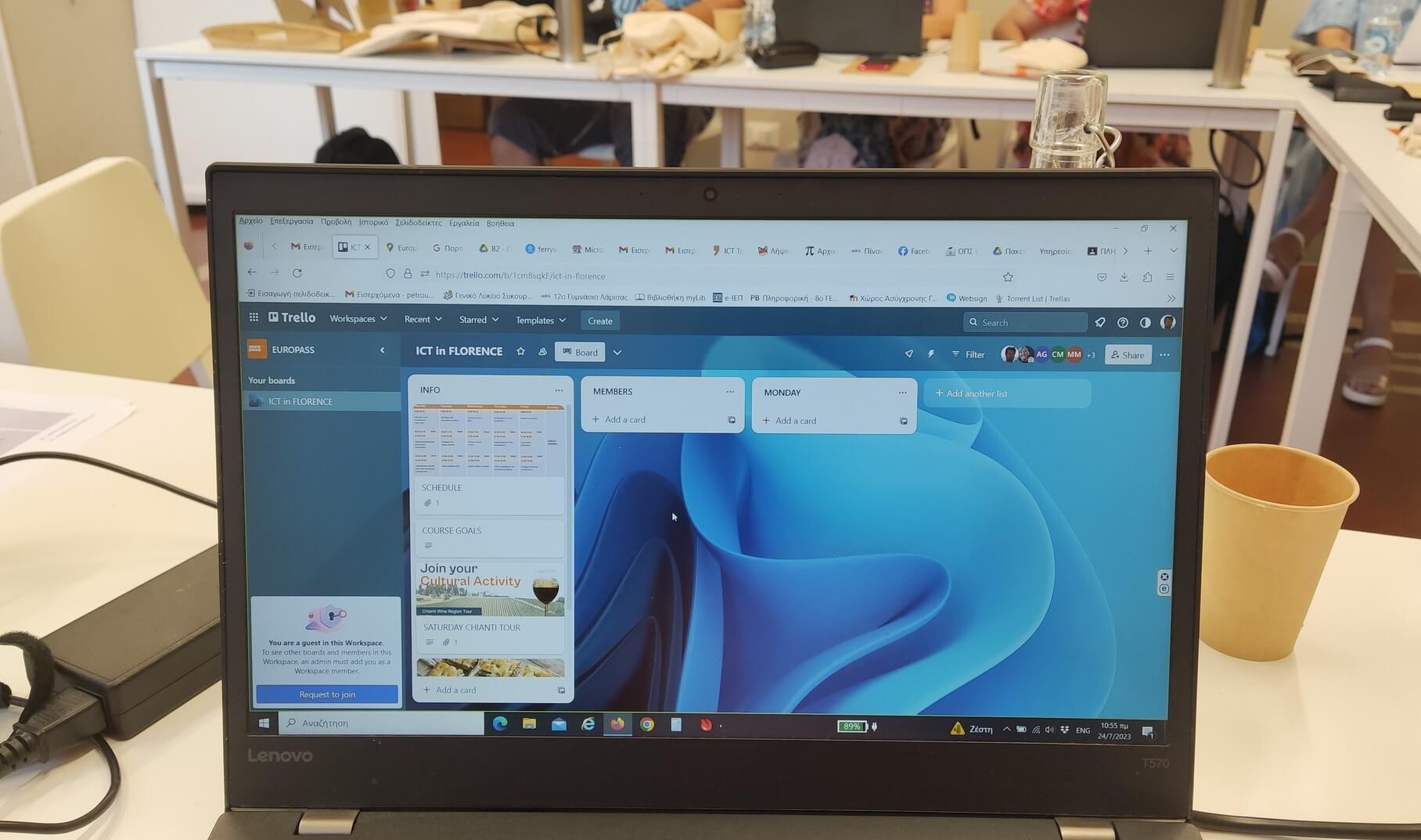
Methodology
Needs Assessment:
Conduct a thorough needs assessment to understand the current state of adult education in Greece,
identifying gaps and challenges related to ICT integration. Survey adult learners to gauge their familiarity
with ICT tools and their preferences for interactive learning experiences.
ICT Tools Familiarization:
Organize introductory sessions to familiarize the trainer with a diverse range of ICT tools, including
interactive whiteboards, online collaboration platforms, digital content creation software, and learning
management systems. Provide hands-on training, allowing the trainer to explore and experiment with these
tools under the guidance of experienced facilitators.
Pedagogical Training:
Offer workshops and seminars on pedagogical approaches tailored for ICT integration. Emphasize active
learning, collaborative problem-solving, and student-centered methodologies, showcasing how these can be
enhanced through ICT tools.
Collaborative Learning Design:
Facilitate sessions on designing collaborative learning experiences using ICT tools. This includes group
activities, virtual discussions, and joint projects. Guide the trainer in developing lesson plans that
encourage peer-to-peer interaction and collaborative knowledge construction.
Digital Literacy Workshops:
Conduct digital literacy workshops focusing on internet safety, online research skills, critical thinking in
evaluating digital content, and effective communication in virtual environments. Encourage the trainer to
explore resources for teaching digital literacy to adult learners, ensuring they can pass on this crucial
skill.
Creation of Multimedia Content:
Provide training on creating multimedia content, including interactive presentations, videos, and online
quizzes. Encourage the trainer to develop their teaching materials using these multimedia formats, ensuring
engagement and interactivity in the adult classroom.
Formative Assessment Techniques:
Train the trainer in using ICT tools for formative assessment, including online quizzes, polls, and
collaborative feedback platforms. Emphasize the importance of real-time feedback and data-driven teaching
strategies for continuous improvement in adult learners' understanding.
Collaborative Platform Implementation:
Guide the trainer in selecting and implementing a collaborative online platform suitable for adult
education. Offer technical support to ensure the seamless integration of the platform into the training
programs, allowing the trainer to create virtual communities of learners.
Project-Based Learning:
Implement project-based learning activities where the trainer, along with peers, designs and implements an
ICT-integrated project. Emphasize real-world problem-solving, creativity, and collaboration, showcasing how
ICT tools enhance the project's outcomes.
Peer Review and Feedback:
Facilitate peer review sessions where trainers can share their ICT-integrated lesson plans and receive
constructive feedback from colleagues and facilitators. Encourage collaborative problem-solving and
brainstorming to address challenges and refine teaching strategies.
Reflection and Action Planning:
Organize reflection sessions where trainers can evaluate the effectiveness of ICT integration in their
teaching practices. Guide trainers in developing action plans, detailing how they intend to implement their
newly acquired skills and knowledge in their respective adult education programs in Greece.
By following this comprehensive methodology, the trainer gained not only technical expertise but also a deep understanding of pedagogical strategies that enhance adult education through ICT tools. This approach ensured that the integration of technology was purposeful, engaging, and aligned with the diverse needs of adult learners, paving the way for a more creative and collaborative classroom environment in Greece.
Training material
- Transform Teaching with ICT Tools for Classroom Management
- Adults' use of ICTs for learning
- Adult Education in a Technological Society
- How Adult Learners Participate in Collaborative Learning
- Video: Using Adult Learning Principles to Create Effective Training
- Video: Digital Literacy and Technology Integration in Adult Basic Skills Education
Training in Florence / Italy
"Transforming Education: Integrating AI, AR, VR, and 3D Printing for Effective Learning"
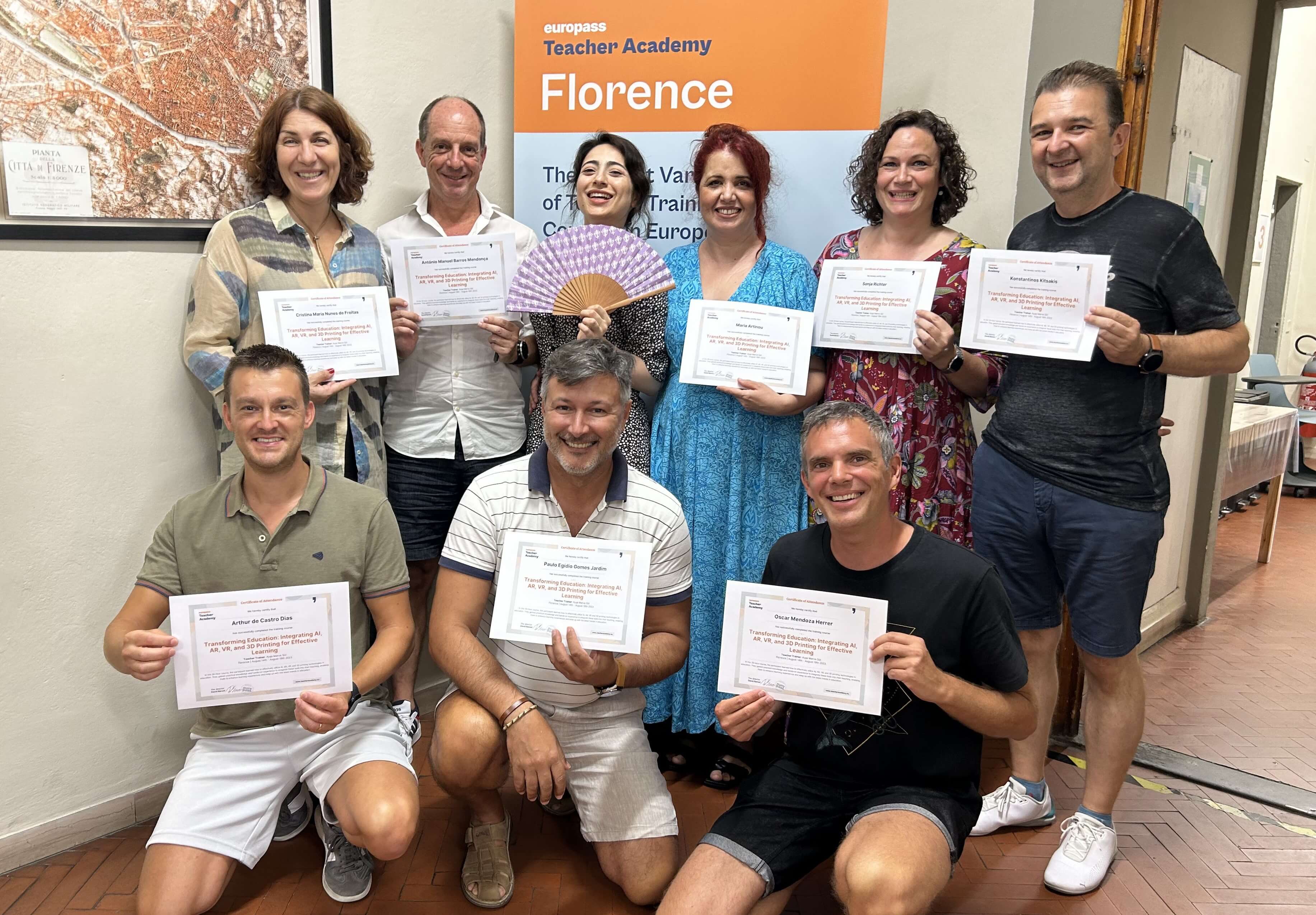
The learning outcomes of the project were:
In the inspiring city of Florence, two dedicated trainers from Digital Idea undertook a
groundbreaking training mobility organized by europass Teacher Academy. Focused on harnessing the
power of
cutting-edge technologies, including Artificial Intelligence (AI), Augmented Reality (AR), Virtual Reality
(VR), and 3D Printing, this transformative experience elevated the trainers' capabilities, shaping a future
of innovative adult education in Greece.
Mastery of Advanced Technologies:
The trainers achieved a comprehensive understanding of AI algorithms, AR applications, VR simulations, and
3D printing techniques. They mastered the technical intricacies, enabling them to harness the full potential
of these technologies in educational contexts.
Innovative Curriculum Development:
Armed with newfound knowledge, the trainers excelled in designing innovative curricula infused with AI, AR,
VR, and 3D printing elements. They crafted engaging and interactive learning experiences that captivated
adult learners, fostering curiosity and a thirst for knowledge.
Personalized Learning Environments:
Through AI-driven adaptive learning systems, the trainers learned to create personalized educational
pathways tailored to individual learners. They explored the potential of AI in analyzing learners' progress,
ensuring tailored interventions and customized content delivery for optimal learning outcomes.
Immersive Learning Experiences:
The trainers delved deep into the world of immersive learning through AR and VR technologies. They designed
captivating virtual environments and augmented reality scenarios, transporting adult learners to
experiential realms that enhanced their understanding and engagement.
Hands-On 3D Printing Applications:
With expertise in 3D printing, the trainers explored hands-on applications of this technology. They crafted
interactive models, prototypes, and educational aids, demonstrating the integration of 3D printing in
creating tangible, visually stimulating learning materials.
Digital Citizenship and Ethical AI:
The training emphasized the importance of digital citizenship and ethical considerations in the age of AI.
The trainers gained insights into teaching adults about responsible technology use, data privacy, and the
ethical implications of AI, ensuring informed and responsible digital behavior.
Collaborative Virtual Learning Communities:
The trainers established collaborative virtual learning communities using AI-supported platforms. They
facilitated discussions, collaborative projects, and knowledge-sharing sessions, harnessing AI to enhance
the sense of community and foster collaborative learning among adult participants.
Enhanced Problem-Solving Skills:
By integrating AI, AR, VR, and 3D printing into problem-based learning scenarios, the trainers honed their
participants' problem-solving skills. They guided adult learners through complex challenges, utilizing
technology as a tool to encourage critical thinking, creativity, and innovative solutions.
Technology-Infused Assessment Methods:
The trainers explored novel assessment methods leveraging AI analytics and AR/VR simulations. They designed
assessments that not only evaluated knowledge but also measured problem-solving abilities within realistic,
technology-enhanced scenarios, ensuring a holistic evaluation of adult learners' skills.
Empowered Digital Educators:
Empowered by their immersive training in Florence, the trainers returned to Digital Idea in Greece as
pioneers of digital education. Their expertise in AI, AR, VR, and 3D printing transformed them into leaders,
shaping the future of adult education by infusing creativity, interactivity, and innovation into every
learning experience.
This training mobility, orchestrated by europass Teacher Academy in Florence, propelled these trainers into the vanguard of educational transformation. The ripple effect of their enriched skills continues to revolutionize adult education in Greece, ensuring a future where technology becomes a catalyst for lifelong learning and meaningful knowledge dissemination.
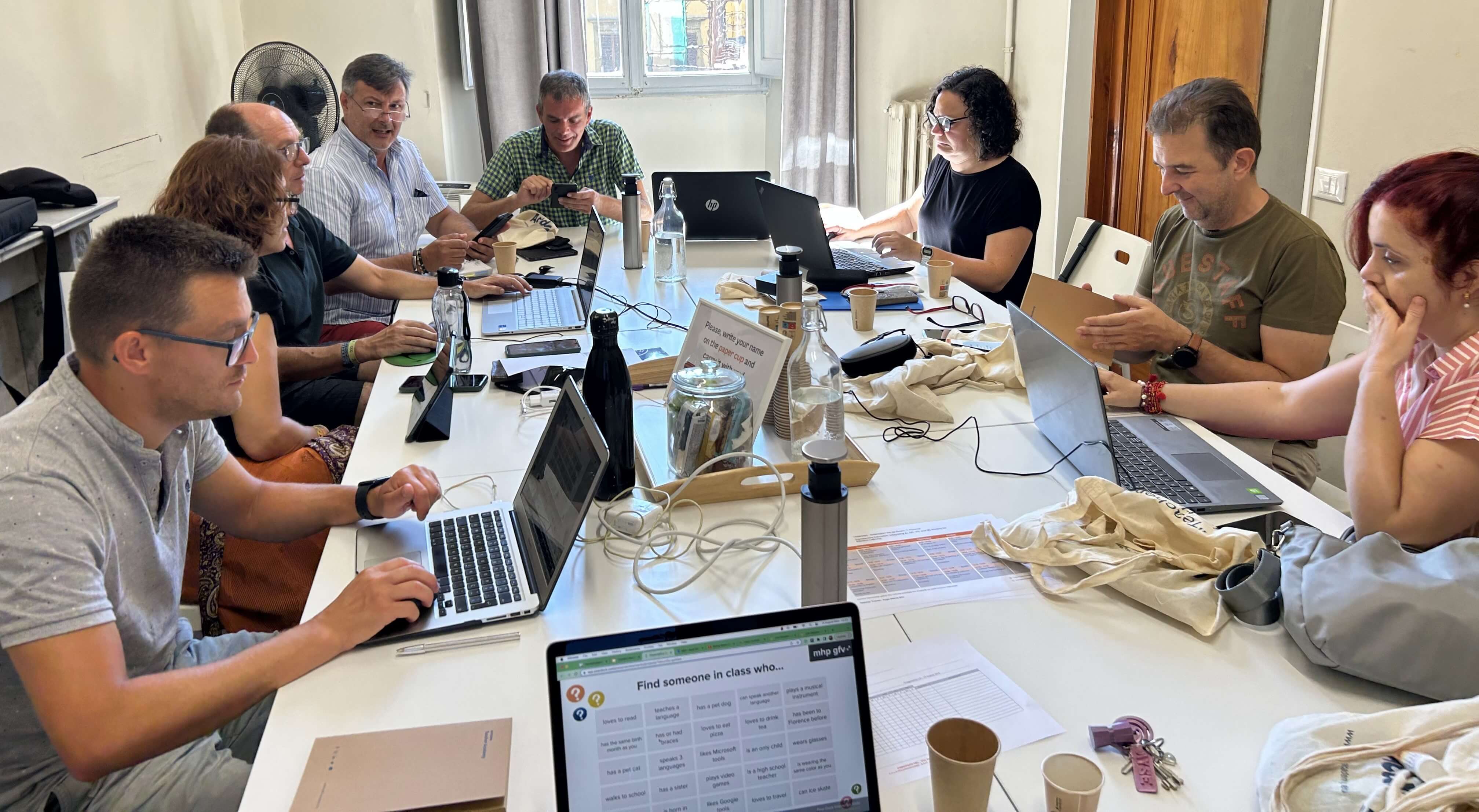
Methodology
Needs Assessment and Customization:
Conduct a detailed needs assessment with Digital Idea in Greece to identify specific educational challenges
and desired learning outcomes.
Tailor the training program based on the assessed needs, emphasizing the integration of AI, AR, VR, and 3D
printing technologies to address the identified gaps.
Theoretical Foundations:
Provide trainers with a strong theoretical foundation in AI, AR, VR, and 3D printing technologies, including
principles, applications, and pedagogical theories.
Explore research papers and case studies illustrating successful implementations of these technologies in
adult education contexts.
Hands-On Workshops and Simulations:
Organize hands-on workshops and simulations where trainers actively engage with AI algorithms, AR
applications, VR simulations, and 3D printing processes.
Facilitate practical sessions where trainers design and create their own AR experiences, VR simulations, and
3D-printed educational models.
Collaborative Learning Projects:
Implement collaborative learning projects that require trainers to work in teams, integrating AI, AR, VR,
and 3D printing technologies.
Encourage trainers to collaboratively develop educational modules or interactive simulations, fostering
teamwork and shared knowledge.
Guest Lectures and Industry Insights:
Invite guest speakers and experts from the fields of AI, AR, VR, and 3D printing to share their insights and
experiences.
Facilitate interactive sessions where trainers can engage in discussions, ask questions, and gain a deeper
understanding of real-world applications.
Ethical Considerations and Digital Citizenship:
Address ethical considerations related to AI algorithms and data privacy. Discuss the importance of digital
citizenship and responsible technology use in the context of these advanced technologies.
Engage trainers in discussions about the ethical implications of AI, AR, VR, and 3D printing, emphasizing
the responsible use of these tools in education.
Pedagogical Strategies and Lesson Planning:
Explore pedagogical strategies for integrating AI, AR, VR, and 3D printing in lesson planning.
Guide trainers in developing lesson plans that incorporate these technologies, ensuring alignment with
learning objectives and engagement of adult learners.
Interactive Demonstrations and Showcases:
Organize interactive demonstrations and showcases where trainers present their AI-driven applications, AR
experiences, VR simulations, and 3D-printed creations.
Encourage peer feedback and discussions, promoting a culture of innovation and creativity among the
trainers.
Formative and Summative Assessments:
Introduce formative assessments using AI-driven analytics to measure participants' progress and adapt the
training accordingly.
Design summative assessments that assess trainers' ability to integrate AI, AR, VR, and 3D printing
effectively into educational contexts, evaluating both technical skills and pedagogical approaches.
Reflective Practice and Action Planning:
Facilitate regular reflective sessions where trainers critically analyze their learning experiences and
identify areas for improvement.
Guide trainers in developing action plans outlining how they intend to apply their newly acquired knowledge
and skills within the adult education programs at Digital Idea.
Ongoing Support and Community Building:
Establish a support network and online community where trainers can continue to collaborate, share
resources, and seek advice post-mobility.
Provide ongoing mentorship and technical support to trainers as they implement AI, AR, VR, and 3D printing
technologies in their teaching practices, ensuring a smooth transition from training to real-world
application.
By following this comprehensive methodology, the training program in Florence empowered the trainers from Digital Idea to confidently integrate AI, AR, VR, and 3D printing technologies into their adult education initiatives. The hands-on, collaborative, and reflective approach ensured a holistic understanding and application of these advanced technologies, enabling the trainers to transform education and provide enriching learning experiences for adult learners.
Training material
- Transforming Education
- 30 AI tools for the classroom
- 50+ Ways ChatGPT Can Support Educators
- A guide to ChatGPT
- AI in the Classroom, 10 Tools for Teachers
- Top 10 Must Use AI Tools for Data Analysis
- 11 Best Educational Apps for Oculus
- Add Augmented Reality to Anything in Seconds
- ENLIVEN YOUR IDEAS FOR ANY NEED
- Google Arts & Culture
- Free STL Files & 3D Printer Files
- PrintLab
- Video: TinkerCAD - Tutorial for Beginners in 9 MINUTES!
